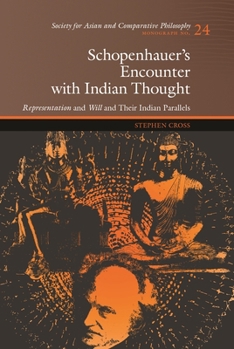Schopenhauer's Encounter with Indian Thought: Representation and Will and Their Indian Parallels
Schopenhauer is widely recognized as the Western philosopher who has shown the greatest openness to Indian thought and whose own ideas approach most closely to it. This book examines his encounter with important schools of Hindu and Buddhist philosophy and subjects the principal apparent affinities to a careful analysis. Initial chapters describe Schopenhauer's encounter with Indian thought in the context of the intellectual climate of early nineteenth-century Europe. For the first time, Indian texts and ideas were becoming available and the belief that they could bring about a second Renaissance--an "Oriental Renaissance"--was widespread. Schopenhauer shared in this enthusiasm and for the rest of his life assiduously kept abreast of the new knowledge of India.
Principal sections of the book consider the two main pillars of Schopenhauer's system in relation to broadly comparable ideas found, in the case of Hindu thought, in Advaita Vedānta, and within Buddhism in the Mādhyamika and Yogācāra schools. Schopenhauer's doctrine of the world as representation, or a flow of impressions appearing in the consciousness of living beings, is first considered. The convergence between this teaching and Indian idealism, especially the doctrine of illusory appearance (māyā), has long been recognized. Schopenhauer himself was aware of it, emphasizing that it was the result not of influence but of a remarkable convergence between Eastern and Western thought. This convergence is subjected to a much more detailed examination than has previously been carried out, undertaken in the light of twentieth-century Indology and recent studies of Schopenhauer. The second main pillar of Schopenhauer's system, the doctrine of the world as will, is then examined and its relationship to Indian thought explored. This section of the work breaks new ground in the study of Schopenhauer, for although the similarity of his ethical and soteriological teaching to that of Indian religions (particularly Buddhism) has long been noted the underlying reasons for this have not been grasped. It is demonstrated that they are to be found in hitherto unrecognized affinities, of which Schopenhauer himself was largely unaware, between the metaphysics of the will and Indian ideas relating to karmic impressions (vāsanās), the store-consciousness, the causal body, and śakti as the "force" or "energy" that maintains the existence of the world. Final chapters discuss the controversial and difficult question of the relation of the will to final reality in Schopenhauer's thought in the light of Indian conceptions, and suggest that the two central pillars of his philosophy may be seen, to a greater extent than previously supposed, as a bridge by which the Eastern and Western traditions of philosophical thought may be brought into a closer and more creative relationship.




